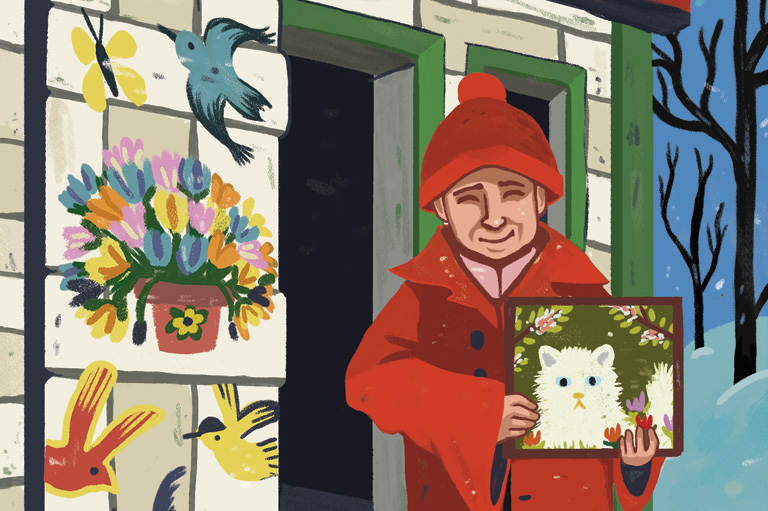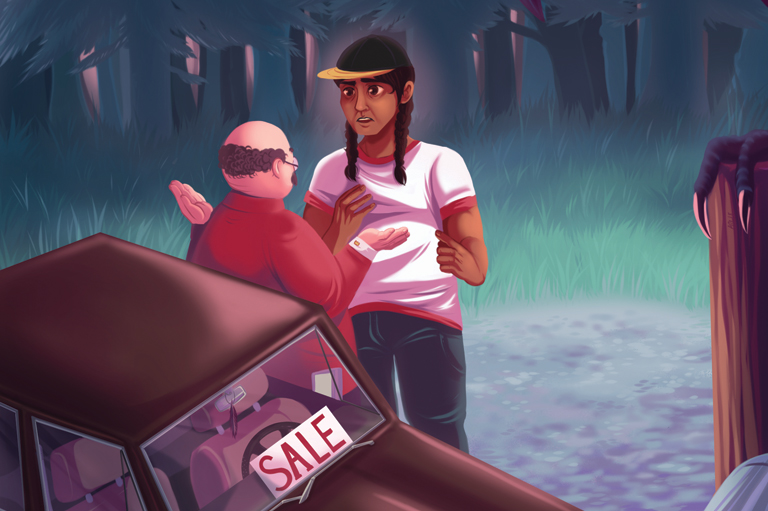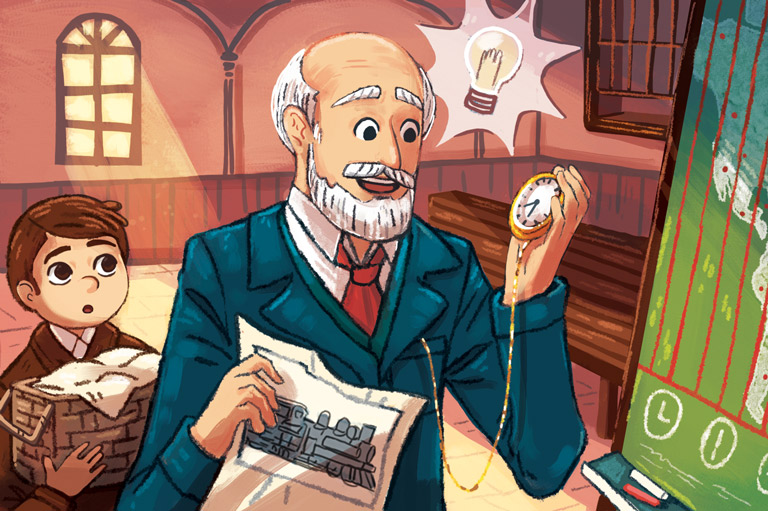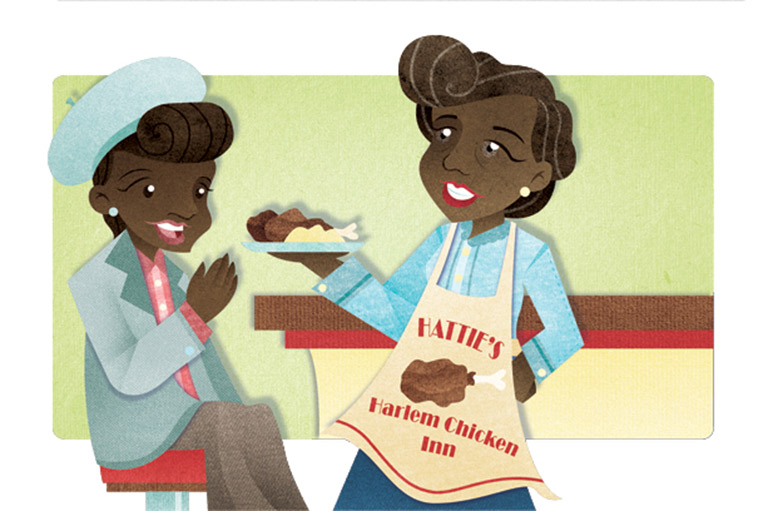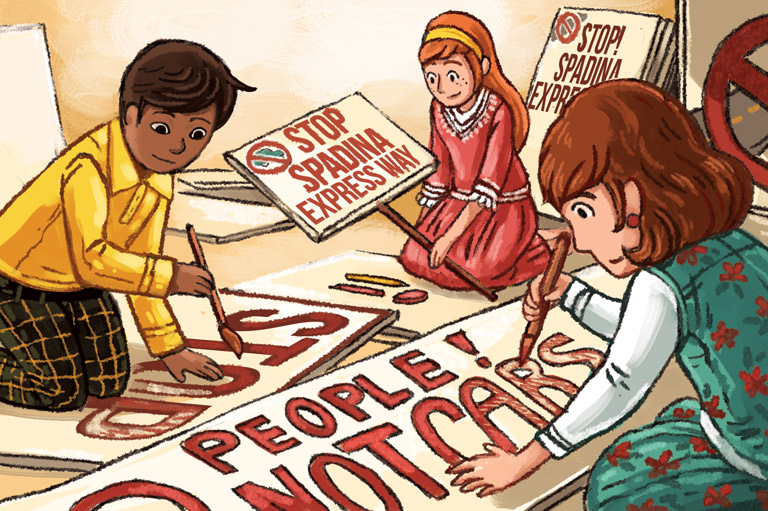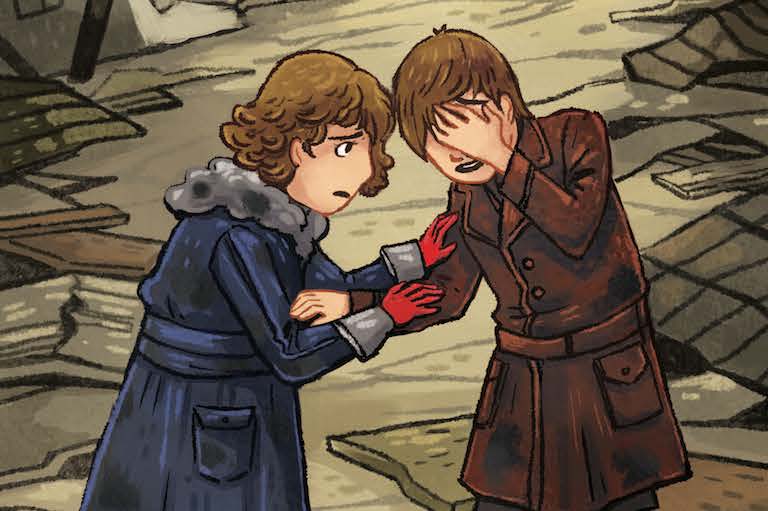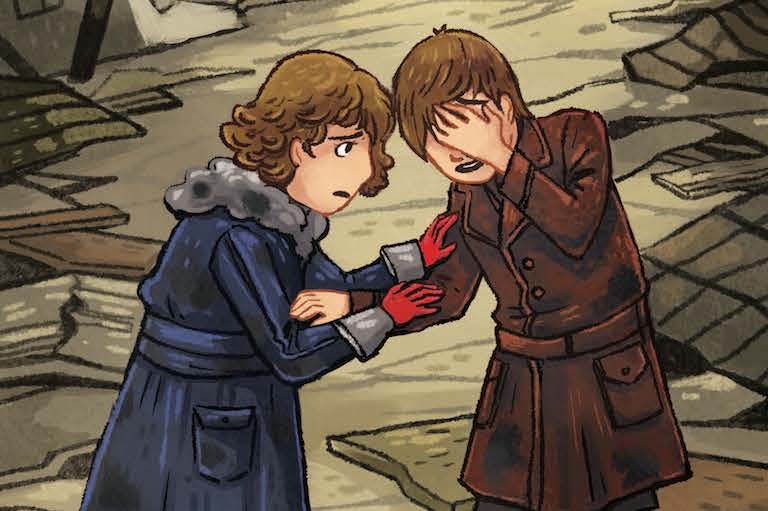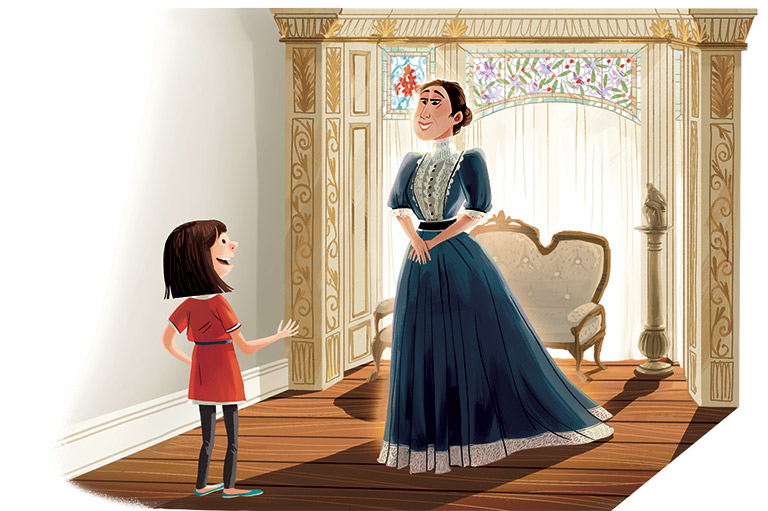The All-Canadian Game: Crokinole
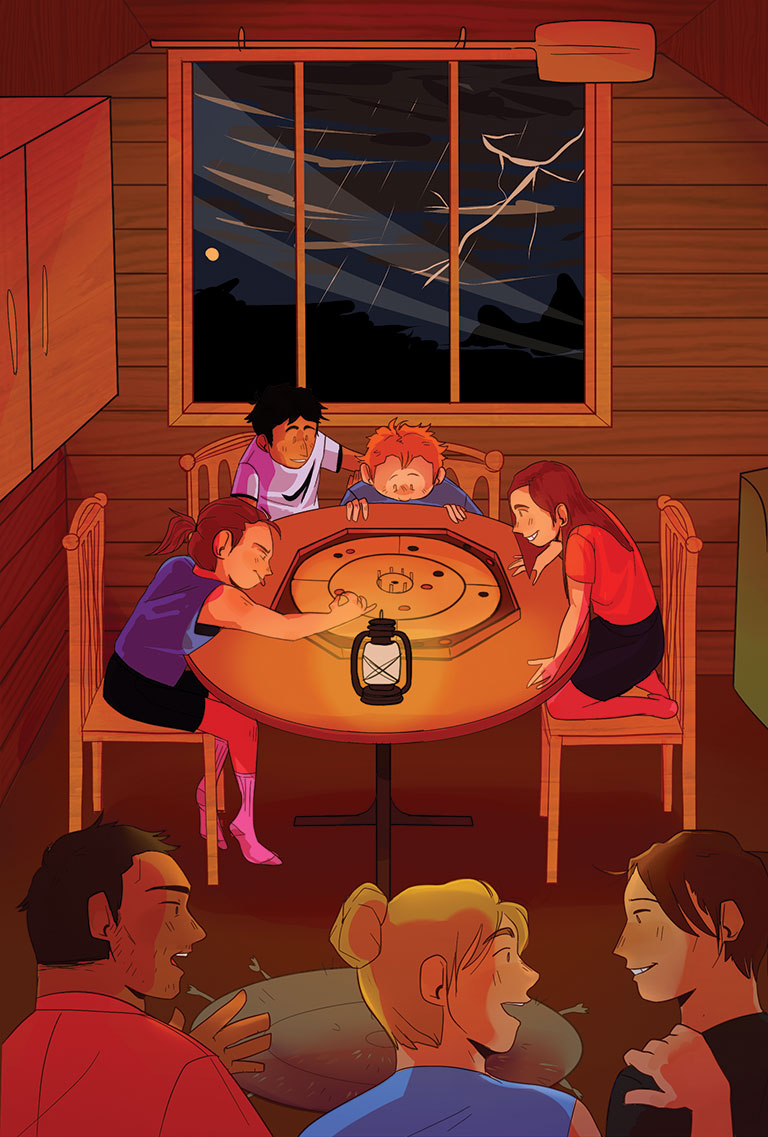
The thunder crashed so hard the walls of the wooden cabin shook and the lights flickered. At the same moment lightning lit up the room and another bone-shattering CRACK sent the cabin into darkness.
“The wifi’s down!” Evan shouted from a bedroom.
“I think everything’s down,” his mother replied, gazing out toward Shoal Lake, which was now just an expanse of darkness. “I can’t see lights anywhere.”
Her sister, already rummaging around in a closet, pulled out a lantern and a handful of candles. “No problem,” she declared, raising her voice over the pounding rain. “We can still have fun!”
Evan emerged from down the hall with his friend Adi and his twin cousins close behind. “Didn’t you hear me? I said the wifi’s down.”
The lantern flared up, throwing a warm circle of light but somehow making the shadows seem darker. “We’re not exactly top priority for the hydro crews up here on the lake,” Aunt Liz said, “so don’t expect power, or the internet, anytime soon.”
She turned to her sister. “We didn’t have the internet when we were kids, and we had a great time up here, right Ally?”
“That’s right. Besides, we came from all over the country to have this week together, not to spend it looking at a bunch of different screens,” Aunt Ally added.
Now it was the girls’ turn to roll their eyes. “If we were back home in Nanaimo, we could be watching a movie,” Erin said.
“Or at least texting,” added her sister Emma, flopping onto the couch.
Just then the door opened and Evan’s dad rushed in, slamming the door as water streamed off him and puddled on the floor. “There are trees down everywhere.”
Aunt Liz tossed him a towel. “You’re just in time for all the complaining.”
“And for this!” Aunt Ally said triumphantly, holding a big, flat octagonal wooden thing under one arm and a small bag with a drawstring in the other hand.
“Crokinole!” her sister grinned. “Perfect! We always used to have huge tournaments when it rained.” The table was soon cleared, the board plunked down and the small round discs, twelve black and twelve red, dumped out of their bag.
“What is this?” Emma asked, curious despite herself. The other three kids gathered around the table.
The centre of the board was a circle about 65 centimetres across with a lower part running all around it and a rim on the very outside. Thin black lines formed a border around the outer part of the playing surface, with another black line forming a circle closer to the middle. In the very centre was a small, shallow hole. Dotted around the central circle were eight short, round pegs.
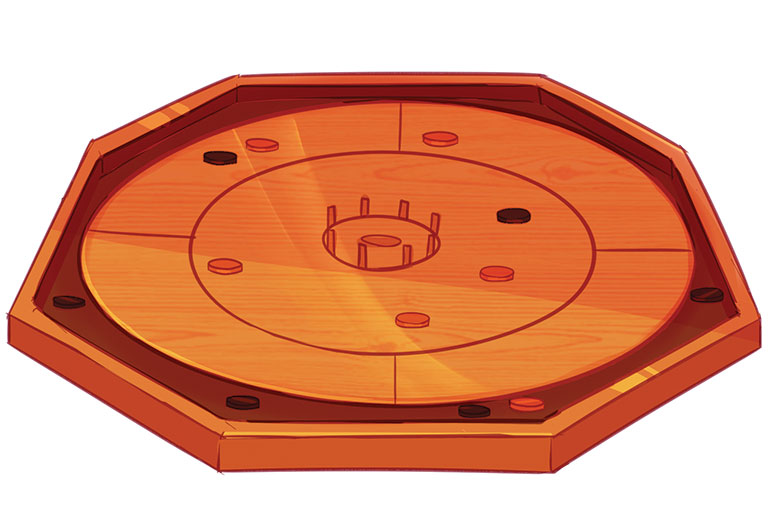
“It’s knipsbrat!” said Evan’s dad with a teasing smile. “Well, that’s what we used to call it. German family. But everybody else knows it as crokinole.”
Evan looked puzzled. “Aunt Liz, I always thought you were saying crokino, like, without the l.”
“I guess that’s what it sounds like,” his mother said, as she curled her first finger against her thumb and flicked one of the discs. It sailed smoothly into the centre hole. “A pocket on my first shot!” she exclaimed.
Her sister pulled the piece out. “I’ve never met anyone outside our family who calls it that. Everybody else calls it a 20-pointer or a 20.”
Adi spoke up. “My grandma has one of these games at her house in Newfoundland. We play it all the time when we visit.”
“I think that was a challenge!” Aunt Ally declared. “Girls against boys?”
“Nothing else to do,” Erin shrugged. “Come on, Em. We’ve never played this but I know we can still beat them.”
Adi was amazed. “You’ve never played crokinole? I thought everybody played crokinole!”
“Not where we live,” Emma said.
“It’s big in Ontario,” Aunt Liz said, “and here in Manitoba. Down East, too.”
The four kids settled in opposite their partners and took some practice shots from their section of the board. Evan scootched his chair a bit to his left and was about to shoot. “No way, pal,” his dad said. “You can’t move your chair.”
“Seriously?” Evan said. “How am I supposed to get at that red piece, then?”
His Aunt Liz leaned over the board and flicked a black disc that effortlessly slid past two posts and knocked the red one out. “Like that. Harder than it looks, isn’t it?”
“Yeah, but it’s actually pretty fun,” Erin admitted, as she stood up partway to get a better angle.
“Nuh-uh!” Aunt Ally said, plunking Erin back down on her chair. “Gotta respect the one-cheek rule.”
The kids looked at her, waiting for an explanation, but she just crossed her arms and smiled.
“One-cheek rule?” Adi finally asked. “What does that . . . oh!” he blushed a little. “You mean you have to keep part of your, um, rear end on your chair.”
“Yup! Okay — first team to 100 wins, but only one team scores in each round, so go for it.” Aunt Ally said.
Outside, the rain pounded as the thunder slowly rolled away into the distance and the lightning moved across the lake. Inside, the players in the warm circle of lamplight laughed and trashtalked as disc after disc flew across the board.
The next morning everything outside sparkled in the sun, the previous night’s storm only a memory. The three adults were sitting on the deck drinking coffee and catching up when Erin and Emma wandered out, yawning and squinting.
“Nice day to go into town for groceries, right double-E?” their uncle asked. “I can drop you and the boys at the chip truck if you want.”
The twins glanced at each other. “Well, actually, we were wondering . . . ”
Adi and Evan burst out of the screen door. “Can we have a crokinole tournament instead?”
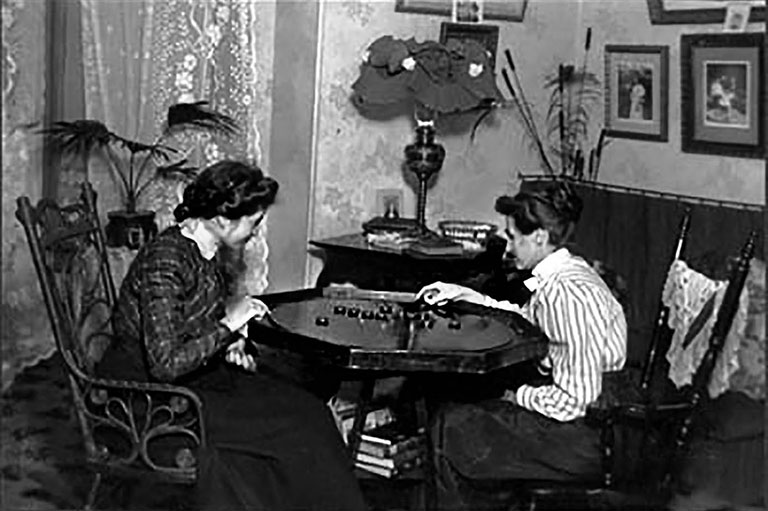
Crokinole is a truly Canadian game: It borrows a bit from both the traditional British game squails and a game called carrom that’s popular in places like India and Sri Lanka.
The first known crokinole board was created in 1875 by Eckhardt Wettlaufer of Perth County in southwestern Ontario as a gift for his five-yearold son. The game is popular in nearly all of Canada and parts of the United States, but many people have simply never heard of it, either.
There are two-player and four-player versions of crokinole, and some people play it using a short wooden stick, called a cue, to hit the discs.
Crokinole clubs were very popular in Canada from the late 1890s to the 1950s, and there are still dozens of clubs, mostly in small Canadian towns. Tavistock, Ont., near where the game originated, hosts the World Crokinole Championship every year on the first Saturday in June.
We hope you’ll help us continue to share fascinating stories about Canada’s past by making a donation to Canada’s History Society today.
We highlight our nation’s diverse past by telling stories that illuminate the people, places, and events that unite us as Canadians, and by making those stories accessible to everyone through our free online content.
We are a registered charity that depends on contributions from readers like you to share inspiring and informative stories with students and citizens of all ages — award-winning stories written by Canada’s top historians, authors, journalists, and history enthusiasts.
Any amount helps, or better yet, start a monthly donation today. Your support makes all the difference. Thank you!
Themes associated with this article
More fiction stories
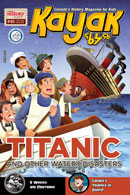
Canada’s History Archive features both English and French versions of Kayak: Canada’s History Magazine for Kids.
Kayak: Canada’s History Magazine for Kids — 3 digital issues per year for as low as $13.99. Tariff-exempt!

